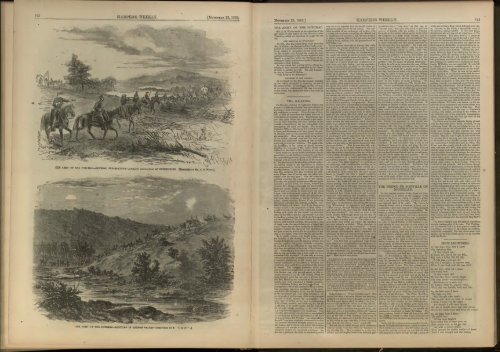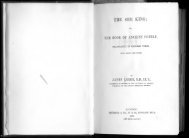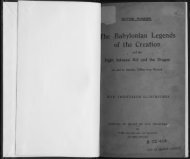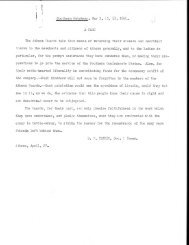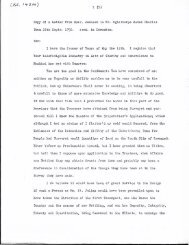Create successful ePaper yourself
Turn your PDF publications into a flip-book with our unique Google optimized e-Paper software.
742<br />
THE ARMY OF THE POTOMAC-GENERAL PLEASANTON'S CAVALhY<br />
HARPEKS WEEKLY. [NOVEMBER 22, 1SC2,<br />
SD AS SKIRMISHERS. MR. A. R.<br />
TUE AKMY OF THE POTOMAC-SCOUTING IN LODDOK VALLEY.-[SKTCBM> Br V A.B.W-'" ,.3<br />
NOVEMBER 22, <strong>1862</strong>.] HARPER'S WEEKLY. 743<br />
THE ARMY OF THE POTOMAC.<br />
MR. A. R. WACD sends ns two sketches <strong>of</strong> the<br />
ADVANCE or THE AHMT or THE POTOMAC INTO<br />
VIBGINIA, which we reproduce on pages 740 and<br />
741.<br />
TRE RIMOVAL OF M'CLRIXAN.<br />
On 10th, after the receipt <strong>of</strong> the order removing<br />
Gen. M'Clellan, the General and his Staff, accom<br />
panied by General Burnside, bade farewell to the<br />
army, visiting in succession several army corps.<br />
As the General rode through the ranks, the torn<br />
and tattered banners <strong>of</strong> the veteran regiments were<br />
dipped to greet him, while the thousands <strong>of</strong> sol<br />
diers gave vent in continuous rounds <strong>of</strong> cheers and<br />
applause to their feelings.<br />
At nine o'clock last evening all the <strong>of</strong>ficers be<br />
longing to heaVl-quarters assembled at the Gener<br />
al's tent to bid him farewell. The only toast giv<br />
en was by General M'Clellan :<br />
"The Army <strong>of</strong> the PotomacI"<br />
SKIRMISH IN THE VALLEY.<br />
At daybreak on the 80th the cavalry, econting<br />
up the valley, succeeded in capturing several <strong>of</strong><br />
the enemy's men. It was foggy, and the advance<br />
<strong>of</strong> our men was undiscovered till they were right<br />
. on the rebels, who skedaddled with a loss <strong>of</strong> six or<br />
seven men.<br />
THE GALLOWS.<br />
ON Monday, October 20, Catharine Wilson met<br />
a doom as righteous as human law ever inflicted on<br />
a criminal whose deeds quite equal the atrocities <strong>of</strong><br />
any malefactor on record. From the age <strong>of</strong> four<br />
teen to that <strong>of</strong> forty-three her career was one <strong>of</strong><br />
undeviating yet complex vice. It sometimes hap<br />
pens that great crimes are exhaustive and exclu<br />
sive in their character, and that breaches <strong>of</strong> the<br />
seventh commandment are not compatible with<br />
sins against the sixth and eighth. Not so with<br />
Catharine Wilson. She was as foul in life as bloody<br />
in hand, and she seems not to have spared the pois<br />
on draught even to the <strong>part</strong>ners <strong>of</strong> her adultery<br />
and sensuality. Hers was an undeviating career<br />
<strong>of</strong> the foulest personal vices and the most cold<br />
blooded and systematic murders, as well as delib<br />
erate and treacherous robberies. We speak with<br />
out hesitftion <strong>of</strong> her crimes as plural, because,<br />
adopting the language <strong>of</strong> Mr. Justice Byles with<br />
reference to the death <strong>of</strong> Mrs. Soames, we not only<br />
" never heard <strong>of</strong> a case in which it was more clearly<br />
proved that murder had been committed, and where<br />
the excruciating pain and agony <strong>of</strong> the victim were<br />
watched with so much deliberation by the murder<br />
er," hntalso because the same high judicial author<br />
ity, having access to the depositions in another<br />
case, pronounced, in words <strong>of</strong> unexampled gravity<br />
and significance, " that he had no more doubt hut<br />
that Mrs. Atkinson was also murdered by Cath<br />
arine Wilson than if he had seen the crime com<br />
mitted with his own eyes." Nor did these two<br />
murders comprise the catalogue <strong>of</strong> her crimes.<br />
That she, who poisoned her paramour Mawer, again<br />
poisoned a second lover, one Dixon, robbed- and<br />
poisoned Mrs. Jackson, attempted the life <strong>of</strong> a third<br />
paramour named Taylor, and administered sul<br />
phuric Acid to a woman in whose house she was a<br />
lodger, only in the present year—<strong>of</strong> all this there<br />
seems to be no reasonable doubt, though these sev<br />
eral cases have received no regular criminal in<br />
quiry. Seven murders known, if not judicially<br />
proved, do not after all, perhaps, complete Cath<br />
arine Wilson's evil career. And if any thing were<br />
wanted to add to the magnitude <strong>of</strong> these crimes it<br />
would be found, not only in the artful and devilish<br />
facility with which she slid herself into the confi<br />
dence <strong>of</strong> the widow and the unprotected—not only<br />
in the slow, gradual way in which she first sncked<br />
out the substance <strong>of</strong> her victims before she admin<br />
istered, with fiendish coolness, the successive cups<br />
<strong>of</strong> death nnder the sacred character <strong>of</strong> friend and<br />
nurse—but in the atrocious malignity by which she<br />
sought to destroy the character and reputation <strong>of</strong><br />
the poor creatures, and to fix the ignominy <strong>of</strong> sui<br />
cide on the objects <strong>of</strong> her own robbery and mnrder.<br />
To do public opinion only simple justice, even<br />
the fanatics <strong>of</strong> the Society for the Abolition <strong>of</strong><br />
Capital Punishment scarcely raised a whisper or a<br />
murmur against this great criminal's execution.<br />
It was felt to be too ridiculous to urge any immu<br />
nity from the gallows on the score <strong>of</strong> the criminal's<br />
sex. What has sex to do with the matter, except<br />
that in this <strong>part</strong>icular case a man could not have<br />
committed the murders? It was only a woman,<br />
with a woman's arts, a woman's insinuating craft,<br />
a woman's admittance to sick rooms, and to the<br />
sacred confidences <strong>of</strong> her sisters, a woman's wo<br />
manliness, that could have perpetrated this string<br />
<strong>of</strong> crimes. The nnhappy precedent which was<br />
said to have been established in the case <strong>of</strong> Celes-<br />
tina Somner was, with general assent, on this oc<br />
casion, reversed; and the Old Bailey, which for<br />
some fourteen years has not seen a woman hung<br />
(for Mrs. Manning was executed at Horsemonger<br />
Lane), once more witnessed a femalo execution.<br />
As to Catharine Wilson, she died asfhe lived. A<br />
ranting letter, full <strong>of</strong> the usual perversions <strong>of</strong> Scrip<br />
ture language, lias been published in her name,<br />
mid it is a fair imitation <strong>of</strong> the morbid literature<br />
<strong>of</strong> the condemned cell; but while deficient in ex<br />
ternal pro<strong>of</strong>s <strong>of</strong> genuineness, there is the strongest<br />
intcinal evidence against its authenticity. No<br />
other sign <strong>of</strong> feeling on her <strong>part</strong> is forthcoming.<br />
Bold, defiant, insolent, and hardened, she left the<br />
world with a lie in her mouth, and the load <strong>of</strong> a<br />
life- <strong>of</strong> guilt which, according to all moral laws,<br />
h.id long since extinguished her conscience. Very<br />
properly, as it seems to us, she was not manipulated<br />
by the dextrous spiritual legerdemain <strong>of</strong> the chari-<br />
tal le gentleman, Mr. Wriglit, " the prison-philan<br />
thropist," who has a mission to condemned convicts.<br />
The present Ordinary <strong>of</strong> Newgate seems to be a sens-<br />
ililo person, and we have been spared the fictitious<br />
euthanasia and ecstatic experiences <strong>of</strong> a wholesale<br />
poisoner's morbid and unnatural penitence. She<br />
was not a penitent, she made no confession, and It<br />
was not to be expected that she shonld confess or<br />
pr<strong>of</strong>ess the least sorrow for her crimes. The only<br />
thing recorded <strong>of</strong> her condemned cell is that, with<br />
a coarse and mendacious stupidity, she affected not<br />
to understand her sentence; and, without a friend<br />
or visitor, deserted slike by God and man, she died<br />
a felon's death, without even the sympathies <strong>of</strong> an<br />
Old Bailey moh.<br />
In one quarter alone has an attempt been made<br />
to revive the vulgar platitudes against capital<br />
punishment. The newspapers generally described<br />
the scene <strong>of</strong> Monday morning, not always without<br />
the usual talk which is talked by penny-a-liners,<br />
hut with a commendable sense <strong>of</strong> propriety. The<br />
Timet, as in such matters it generally does, took<br />
the lead, in a report which was characterized by<br />
good sense and right feeling; and the regulation<br />
report, communicated generally to the other pa<br />
pers, only sinned in the grandiloquence <strong>of</strong> its style<br />
and the impenetrable obscurity and recondite dif<br />
ficulty <strong>of</strong> its allusions. Fine writing, however, is<br />
a venial sin when measured against indecent mis<br />
representation <strong>of</strong> facts and a studied insult to com<br />
mon sense. We can pardon the writer, paid by<br />
the number <strong>of</strong> his sentences and the minuteness <strong>of</strong><br />
his report, who talked <strong>of</strong> female executions as re<br />
sembling angels' visits, because they were few and<br />
far between, in consideration <strong>of</strong> the information—<br />
new, we own, to ourselves—that it was formerly<br />
the custom, not only to preach condemned sermons,<br />
but to place a halter in the felon's pew and a c<strong>of</strong>fin<br />
in the aisle <strong>of</strong> Newgate Chapel, during the service<br />
<strong>of</strong> the Sunday preceding a hanging day. Nor are<br />
we much disposed to quarrel with the same ingen<br />
ious scribe's vivid description <strong>of</strong> the crowd before<br />
the gallows, in which -we are informed that " the<br />
few respectable people present were as waifs and<br />
spars on the strong tide that rolled and surged<br />
against the prison walls, the merejktsam and jet-<br />
tarn <strong>of</strong> that vast sea <strong>of</strong> scoundrelism." Indeed, we<br />
rather admire his discrimination which identified<br />
all the boys present with those " miniature masses<br />
<strong>of</strong> rags, dirt, vice, and iguorant cunning, who, to<br />
the disgrace <strong>of</strong> onr police, imperil their own poor<br />
lives by turning heels over head for the delectation<br />
<strong>of</strong> boobies who fling them half-pence from tbe tops<br />
<strong>of</strong> omnibuses;" and we appreciate that very fine<br />
sentence which describes the " roar <strong>of</strong> the crowd,<br />
and the shrill laughs and snatches <strong>of</strong> song which<br />
broke now and then on the hoarse diapason <strong>of</strong> blas<br />
phemous ribaldry." This is mere fine talk, writ<br />
ten with an eye to the inch measure <strong>of</strong> the sub<br />
editor. Nor are we much moved to criticise an<br />
other fine writer's description <strong>of</strong> the war <strong>of</strong> the ele<br />
ments, which, throughout the night before the ex<br />
ecution, seemed to be in horrid harmony with the<br />
approaching tragedy. The entrance <strong>of</strong> the gallows<br />
—<strong>of</strong> course "the fatal machine"—is rendered, as<br />
art-critics say, with a considerable subtlety, as, in<br />
the darkness and grimriess <strong>of</strong> three o'clock on a<br />
stormy morning, the " hideous apparatus <strong>of</strong> death,<br />
well fitted to strike terror into the most savage<br />
heart, is brought out with a horrid rumbling<br />
sonnd." We accompany, with a dim sense <strong>of</strong> some<br />
sort <strong>of</strong> meaning, the same famous hand, when he<br />
describes "the death-bell and its low solemn ca<br />
dences stealing over the crowd and the criminal<br />
herself;" and just as Macaulay describes the bea<br />
con-lights streaming from Eddystone to John <strong>of</strong><br />
Groat's, so with tolerable patience we endure to<br />
be informed how " from Southwark and Lambeth<br />
thousands came trooping over Blackfriars Bridge,<br />
while Bermondsey sent its multitudes over London<br />
Bridge, and Saffron Hill and the Seven Dials sent<br />
their eager reinforcements, till, joining the stream<br />
from Whitechapel, an impetuous and seemingly<br />
endless torrent, through Barbican and Smithfield,<br />
was absorbed in the great lake by which the gal<br />
lows was encircled." But when we come to the<br />
closer touches <strong>of</strong> the tragic artist we own that we<br />
are lost. Mrs. Wilson, we are told, was dressed<br />
" in a light morning gown." The scene is the<br />
press-room, from which, we believe, the reporters<br />
are very properly excluded. What, therefore, is<br />
left hut an opportunity for meditation? "It was<br />
an awful thought, while looking at her, that all<br />
the minnte circumstances which impressed the<br />
spectators in that sad chamber were, at the same<br />
time, fixing their objects on the tablet <strong>of</strong> her mind<br />
—so quickly to be shattered and cast into obliv<br />
ion." The fact that circumstances were fixing<br />
their objects on a mental tablet is certainly an aw<br />
ful thought to a psychologist. But the reporter<br />
in the Daily Telegraph, to whom we are indebted<br />
for this meditation, has something." more to tell,<br />
which may require possibly an effort <strong>of</strong> moral conr-<br />
age." Here are his own words:<br />
It IB, however, in all ite grotesque horror that we would<br />
present this scene to our readers; nor can we think it pru<br />
dent, or in any way desirable, that & single touch <strong>of</strong> its<br />
character should be s<strong>of</strong>tened down. Our words, we know,<br />
will cause a shudder through all England. Be it fo. En<br />
gland hag sometimes need to ehudder and turn pale at<br />
truths within the ken <strong>of</strong> her current history. V\ hen Cath-<br />
'arine Wilson stood pinioned in her long, loose gown on<br />
that ghastly stage—when the hangmau fastened a cord or<br />
strap round the nldrt <strong>of</strong> her dress, a little below the knee,<br />
BO as to keep the folds together and to prevent her strug<br />
gling in the last agony—when he drew a long white cap<br />
over her head, the mob at once saw, recognized., and laughed<br />
at an image exactly resembling a figure with which the<br />
walls and boardings <strong>of</strong> London are placarded. It was a<br />
low, stifled langh, that ran through the brutal concourse;<br />
and in the tone <strong>of</strong> ita deep cynicism there was, as we fan<br />
cied, a rough, harsh kind <strong>of</strong> pity.<br />
CEdipus help ns! What does this mean ? If it<br />
means that when Catharine Wilson was standing,<br />
strapped and pinioned, below the gallows, she looked<br />
like that queer figure which is called " the Cure,"<br />
we can only say that to inform us <strong>of</strong> this odd like<br />
ness is a matter <strong>of</strong> very had taste, and shows to<br />
what degradation sensation writers will stoop; but<br />
it is not a piece <strong>of</strong> information which will " cause a<br />
shudder throughout England." On the contrary,<br />
just as the fact <strong>of</strong> Mrs. Manning being hnng in<br />
black satin sent satin out <strong>of</strong> fashion from that day<br />
to this, so let us hope that Mrs. Wilson's hanging<br />
may discredit the absurd li Cure" popularity.<br />
But all this is venial enough when contrasted<br />
with an article, "Another Account," furnished to<br />
the Morning Star. This is written by a very deep<br />
thinker and philosopher indeed—ne ordinary p»n-<br />
ny-a-Hner—but a "real man," as they say, an<br />
" earnest man," who tries very hard to unite the<br />
manner <strong>of</strong> Carlyle with the matter <strong>of</strong> Dickens.<br />
He sc<strong>of</strong>fs at the notion—whose notion is it?—that<br />
the hangman is a great moral teacher, and he<br />
classes among "the shams and nnveracities" the<br />
view that capital punishment is a lesson to crime.<br />
In more ways than one this public instructor in<br />
the Morning Star is a curiosity. He it the only<br />
man in England who thinks—only he does not<br />
think, hut merely affects to think—that "the<br />
grounds on which Catharine Wilson has been ele<br />
vated to the position <strong>of</strong> a modern Brinvilliers are<br />
questionable;" and he goes so far as to say that-<br />
her brazen impudence in the prison and on the<br />
scaffold "was the theme <strong>of</strong> general admiration."<br />
Further, he calls ns to remember the case <strong>of</strong> Eliza<br />
Penning, who certainly was executed an innocent<br />
woman, and h« talks <strong>of</strong> " a poison panic." That<br />
is to say, there is one writer who'has the insolence<br />
to say, or rather to hint, that Catharine Wilson<br />
was probably innocent, and has been sacrificed by<br />
an unjust judge and a terrified jnry to a popular<br />
panic on the subject <strong>of</strong> secret poisoning. His<br />
argument is the old stale one <strong>of</strong> Mr. Charles Dick<br />
ens. Capital punishments are wrong, because the}*<br />
do not appear pr<strong>of</strong>itably to affect the moh present<br />
at an execution; and by way <strong>of</strong> " The Moral," the<br />
Morning Star appends to this narrative <strong>of</strong> Catha<br />
rine Wilson's execution the Police Report which<br />
announces that two persons were brought before<br />
Alderman Mechi, charged with picking pockets at<br />
the Old Bailey, at the very foot <strong>of</strong> the gallows. It<br />
is almost as absurd to refute this argument as to<br />
nrge it. As though, wherever there was a crowd,<br />
there would not be pickpockets; and as though it<br />
would not bs quite as reasonable to argue the duty<br />
<strong>of</strong> prohibiting Confirmations at Church, a corona<br />
tion, or one <strong>of</strong> Mr. Bright's Manchester meetings,<br />
because they, too, were attended by pickpockets.<br />
But, further, the argument is, that people who<br />
witness an execution are not deterred from crime,<br />
becense, while the drop is falling, they play all<br />
sorts <strong>of</strong> tricks, and indulge in loose and drunken<br />
demeanor. But where is the necessary connection<br />
between the two things? Who knows whether<br />
and when a coarse and brutal nature is or is not<br />
serionsly affected ? A costermonger may joke at<br />
the gallows; but it may affect him seriously, nev<br />
ertheless. It does not follow that a man is not<br />
frightened, because he grins and plays the fool.<br />
An incipient murderer may, for anght Mr. Dickens<br />
knows, be warned <strong>of</strong>f a coming i-rirae, even though<br />
he cuts lewd jukes at Calcraft and his moral lesson.<br />
But all this is beside the real question. We do<br />
not say that capital punishment is only didactic.<br />
It may be, and it very <strong>of</strong>ten is, a deterring instru<br />
ment ; and we do not deny that the gallows is a<br />
warning and terror to evil-doers. We believe that<br />
hanging does produce a serious effect, even on the<br />
wretched crowds who witness it. But capital pun<br />
ishment is more than a moral lesson, and more than<br />
all this. It is an exhibition, on tbe largest and<br />
most awful scale, <strong>of</strong> that div ine justice the admin<br />
istration <strong>of</strong> which is intrusted to law.<br />
THE PRINCE DE JOINVILLE ON<br />
M'CLELLAN.<br />
IN the current number <strong>of</strong> the Revue del Deux<br />
Mondes there is an article on the campaign <strong>of</strong> the<br />
Army <strong>of</strong> the Potomac, which is generally attrib<br />
uted to the Prince de Jpinville, and bears abund<br />
ant internal signs <strong>of</strong> its origin. The Prince de<br />
Joinville writes with a clearness, a force, and a<br />
moderation which have scarcely ever been brought<br />
to bear on the description <strong>of</strong> American affairs. He<br />
writes <strong>of</strong> military affairs with a pr<strong>of</strong>essional knowl<br />
edge and power <strong>of</strong> criticism, hut with a simplicity<br />
and a lucidity for which civilians may be thankful.<br />
The Prince is decidedly favorable to M'Clellan.<br />
He tells us that M'Clellan at first intended to at<br />
tack directly in front, and that he only waited for<br />
the spring to advance. He knew quite well that<br />
the wooden cannon, which he was so much langh-<br />
ed at for not taking, were only made <strong>of</strong> wood, but<br />
he considered it scarcely worth while to take even<br />
wooden cannon unless he could advance beyond,<br />
and the state <strong>of</strong> the roads would not permit him.<br />
Before, however, the time came wheu an advance<br />
was possible, he learned that the Confederates had<br />
so completely destroyed the means <strong>of</strong> communica<br />
tion that he would have had to spend weeks in the<br />
1:1 ru construction <strong>of</strong> the road that was to take him<br />
ti • 1 Richmond, and feed him on his way. He<br />
the: ire determined to take his army round by<br />
sea, and ascend the James River. He was begin<br />
ning his preparations with the utmost secrecy,<br />
when he was ordered to Washington to attend a<br />
general conncil <strong>of</strong> war. The-other generals pres<br />
ent made various proposals, all, <strong>of</strong> course, based on<br />
the supposition that the army was to more by laud<br />
southward. This forced M'Clellan to reveal that<br />
he did not propose to go that way at all, bnt to<br />
take his army round by sea. Immediately this<br />
was known, although only confided in this way to<br />
a few men <strong>of</strong> the highest position, a mysterious<br />
feminine influence conveyed it to the Confederates,<br />
and they had time.to make those preparations at<br />
Yorktown and at various <strong>part</strong>s <strong>of</strong> the peninsula<br />
which threw so much difficulty subsequently in<br />
the way <strong>of</strong> the Federals. The Prince describes,<br />
with much beauty <strong>of</strong> language and liveliness <strong>of</strong><br />
feeling, the incidents <strong>of</strong> the march, from the land<br />
ing to the final position on the Chickahominy.<br />
M'CIellan's plan was, he thinks, quite right, and,<br />
according to all probability, the Federals ought to<br />
have won and taken Richmond; but several cir<br />
cumstances combined to baffle M'Clellan. We<br />
have, perhaps, heard <strong>of</strong> them all before, but still<br />
they liaVB a certain novelty when presented for<br />
the first time by a competent and trust-worthy ob<br />
server.<br />
In tbe first place, there was the scandalous treach<br />
ery in the Federal council-room, which revealed to<br />
the Confederates exactly what M'Clellan was go<br />
ing to do; and the consequence was that the Fed<br />
eral army bad to for** it* way through a scries <strong>of</strong><br />
works and military lines, which although soon tak<br />
en, yet cost, on the whole, a lamentable waste <strong>of</strong><br />
the precious spring weather. In the next place,<br />
the summer was wet beyond all experience <strong>of</strong> Vir<br />
ginian summers. The army lived in a perpetual<br />
down-pour, and had to march through a vast flood.<br />
It was with the utmost difficulty that artillery could<br />
be moved on at all, and this made the approach all<br />
the more slow, the facility <strong>of</strong> concentrating an op<br />
posing Confederate force all the greater, and the<br />
sickness all the more terrible. Thirdly, the Mer.<br />
nmac, although kept from destroying the flset or<br />
interfering with the landing <strong>of</strong> the troops by the<br />
presence <strong>of</strong> the Monitor, yet paralyzed the Fed<br />
eral gun-boats, and forced the army to march by<br />
land without the assistance it expected by water.<br />
Lastly, M'Clellan was not supported. He was left<br />
to himself, and denied reinforcements in a way<br />
which reflects the greatest disgrace on the Wash<br />
ington authorities. When he took np his station<br />
at the junction <strong>of</strong> the Chickahominy and the road<br />
to West Point, he could with the greatest ease have<br />
co-operated with M'Dowell, whose assistance would<br />
have been invaluable to him, and who was doing<br />
nothing where he was stationed, ahont thirty miles<br />
to the north <strong>of</strong> Richmond. But M'Dowell received<br />
exprese orders by telegraph from Washington not<br />
to help M'Clellan. The Prince thinks that the<br />
cause <strong>of</strong> this was a ridiculous fear that Washing<br />
ton was not quite safe, and a feeling that there was<br />
no knowing where the Confederates might turn up.<br />
The consequence was, that in the series <strong>of</strong> battles<br />
which followed M'Clellan was beaten by the su<br />
periority <strong>of</strong> the numbers <strong>of</strong> the Confederates, who<br />
gave up every thing in order to beat him. They<br />
succeeded; and he made his way to Harrison's<br />
Landing—the victim, according to the Prince, <strong>of</strong><br />
bad weather, and <strong>of</strong> the miserable, incompetent,<br />
selfish, treacherous set who bad got hold <strong>of</strong> the<br />
reins <strong>of</strong> power at Washington.<br />
The Prince was, in some respects, highly pleased<br />
with the American army. Here, <strong>of</strong> course, he can<br />
not be over frank. He can not indulge in any very<br />
plain criticisms on the <strong>of</strong>ficers with whom he has<br />
lately been living, and who received him with<br />
kindness and respect. But he makes some general<br />
remarks. That the men fought on both sides with<br />
the greatest pluck has long ago been made known<br />
to the world by the frightful carnage which is the<br />
one result even <strong>of</strong> battles that have no other. The<br />
Prince was also greatly struck with the chearful-<br />
ness, and ease, and skill, with which the men set<br />
themselves to work at natural difficulties, the celer<br />
ity with which they made clearings, the adroitness<br />
with which they constructed temporary roads, and<br />
moved heavy guns. Bnt he was also much struck<br />
with a certain slowness and languor which they dis<br />
played when acting in large bodies. This even<br />
extended to the generals; and the Prince, though<br />
scarcely saying so in plain terms, evidently thinks<br />
that even M'Clellan was not quick enough, and lost<br />
opportunities which a commander who could have<br />
moved his troops more quickly might have seized.<br />
This the Prince attributes to the general habits <strong>of</strong><br />
the people. They are accustomed to act for them<br />
selves, but not to act with each other; and the<br />
energy they show in pushing forward on their own<br />
account disappears when they come to pushing for<br />
ward in a body. Perhaps we may gather that he<br />
does not consider the American army, as a whole,<br />
equal to that <strong>of</strong> a great Continental power. He<br />
was also much impressed with the odd coolness <strong>of</strong><br />
the people in many respects. He mentions the em-<br />
balmers, who freely comforted the army with the<br />
assurance that, for a very moderate price, a dead<br />
man might be sent home pickled, so that death lost<br />
half its sting. He also tells us that during the<br />
whole <strong>of</strong> one <strong>of</strong> the hottest battles <strong>of</strong> the Chicka<br />
hominy newspaper-sellers went up and down the<br />
lines crying out the latest news from New York,<br />
and found purchasers for the journals they had to<br />
sell.<br />
The Prince thinks that M'CIellan's expedition<br />
was the tnrning-point <strong>of</strong> the war. The Washing<br />
ton Government had it in their power to make the<br />
expedition, according to all hnman probability,<br />
completely successful. But they threw away theii<br />
chance, and now the South stands on an equality<br />
with the North.<br />
BLUE LIGHTNING.<br />
O, THE days when first I knew<br />
The lightning blue<br />
Of that bright eye!<br />
It smote me, yet it did not kill,,<br />
Bnt with a l<strong>of</strong>tier life did fill,<br />
A life that could not die—<br />
As then I thought: O, rapture rare,<br />
When I was fond, and she was fairl<br />
O, the days when <strong>of</strong>t I knew<br />
The honey dew<br />
Of that bright lip!<br />
My bee-like kisses deeply sought<br />
The rosy petals—nectar-fraught—<br />
Enchantment in each sip!<br />
O, raptnre wild! O, raptnre rare!<br />
When she was faithful, fond, and fair.<br />
O, the fatal honr I knew<br />
The lightning blue<br />
Was fraught with death—<br />
The ice-bolt clove rny heart in twain!<br />
I think I ne'er can die again:<br />
For though I still have breath,<br />
My life is nanght since that cold gleam<br />
Smuts the warm fount and froze the stream.<br />
O, the fatal hour I knew<br />
The pallid hue<br />
Of lips once bright!<br />
Love-laden lips <strong>of</strong> days gone by,<br />
Bore poison now to bid jpc die,<br />
As, with a tremor slight,<br />
They dropp'd the deadly words!—I knew<br />
That I wai wrongM and sh« untrue.


